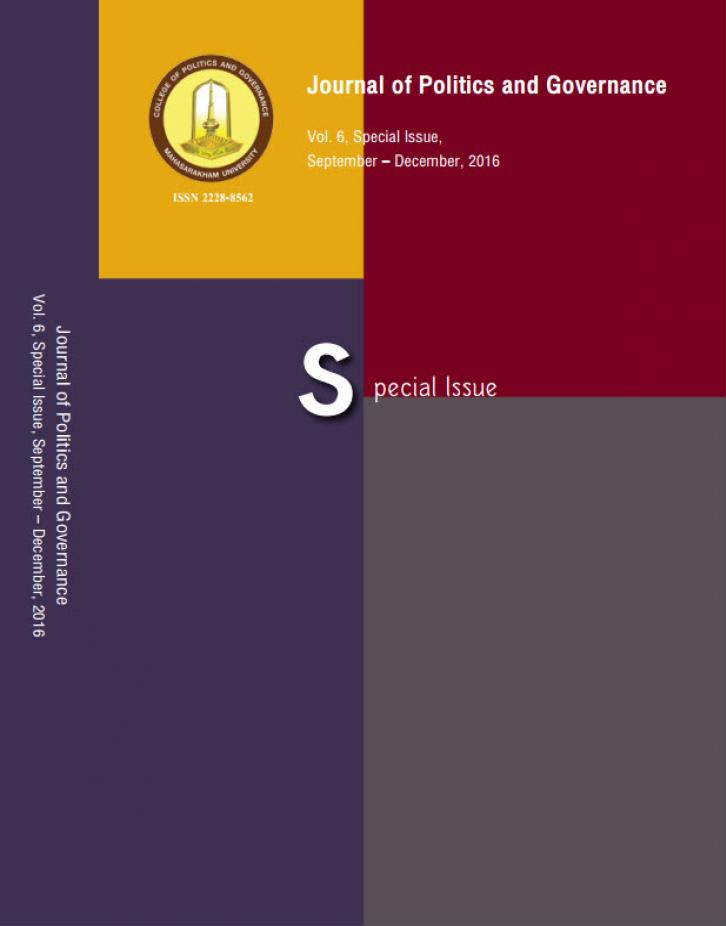Networks of Civil Society Organizations dealing with Government’s Project Development in Pak Bara Area, Southern Thailand
Main Article Content
Abstract
Two main purposes of this study are 1) to examine networks and roles of Civil Society Organizations (CSOs)dealing with government’s developing project in Pak Bara area. 2) to recommend directions for the CSOs’ further participation in developing the Pak Bara area.The research used a mixed method of qualitative and quantitative which include non-participatory observation, in-depth interviews, focus groups, workshop discussions, and a survey.It was found that they are 10 active CSOs and 2 NGOs. Their participation in development could be classified into three levels: local, provincial, and regional as well as international.They demand appropriate ways of conserving and managing the natural resources are more beneficial than the economic growth expected by the government and international traders. They attempt to drive the consequent problems to the level of resources and income sources, relocation due to land expropriation, air pollution, loss of public issues that need people’s participation in policy- and decision making: loss of natural traditional ways of life and collapse of society, and destruction of tourism. This research has two recommendations. First, at local level, the networks should add more religious and cultural dimensions in driving activities, and strengthen relationships between networks and communities around Pak Bara with the cooperation of community leaders. Second, at the national and international level, the networks should enhance understanding and cooperation with communities.
Article Details

This work is licensed under a Creative Commons Attribution-NonCommercial-NoDerivatives 4.0 International License.
References
Carpini, M. X. D., Cook, F. L., & Jacobs, L. R. (2004). Public Deliberation, Discursive Participation, and Citizen Engagement: A Review of the Empirical Literature. Annual Review of Political Science,7 (1), 315 -344.
Ehrenberg, John. (1999). Civil Society: the Critical History of an Idea. New York: New York University Press.
KreuthepVeerasak. (2007). Networks: An Innovation of Local Administrative Organizations. Bangkok: The Thailand Research Fund.
Mitchell, R. E., & Reid, D. G. (2001). Community integration: Island tourism in Peru. Annals of Tourism Research, 28(1), 113-139.
Na-sae, Banjong. (2002). Community-Based Natural Resources Management: Case Studies from Southern Thailand’s Traditional Local Fishery Communities. Songkhla: Feong-fa Printing Company Limited.
Pornchai Trakulwaranont. (2006). Social Capital and Patterns of People’s Political Participation in Thailand. Bangkok: Sanya Thammasak Institute for Demmocracy, Thammasat University.
PuntasaenApichai. (1996). Concepts, Theories, and Overviews of Development. Bangkok: Amarin Printing and Publishing.
People’s Networks for Monitoring the Development Plans of Satun. (2013). Non- confidential Secret: The Deep Sea Port Project at Pak Bara, Satun The Project of More than Twenty Times of Standard Dangerous Impact on Community. Satun: Ngua Ngaan Publishing.
Suppawongs Chuchai and Yuwadee Kadkanklai, eds. (1998). Prachasungkom: Thinkers’ Views in Thai Society. Bangkok: Matichon Publishing.
Websites
Bunjong Na-sae 1-3. There Will Be Conflicts in Pak Bara. in ASTV Manager Online 9-23 May 2012. http://www.manager.co.th/daily/ViewBrowse.aspx? BrowseNewsID=1509&SourceNewsID=1589, accessed on12 December 2012.
Nalinakumari, B. and MacLean, R. (2005). NGOs: A Primer on the Evolution of the Organizations That Are Setting the Next Generation of “Regulations”.in Environmental Quality Management, Summer. Available URL: http://www.environmental-expert.com/Files%5C8707%5Carticles%5C4629% 5C4629. pdf (December 2012)
Nipaporn Prasertsri. (2001). Kra Isthmus History (The Thai Canal), http://www.thai-canal.org/PDF%20file/hist%2001E.pdf
Roles of Thai Non-Governmental Organizations. http://www.thaingo.org/story/info_004.htm accessed on 7 December, 2012.
Interviews
Abdulrosak Hemwang member of Political Interviewed on stage on
Development Council Oct. 7, 2012
Aree Tingwang Local Fishery Group Oct. 7, 2012
Huddeen Usma Leader of Pak Bara Bay Oct. 7, 2012
Conservation Group 3
Jehna Wuttanapun Tamalai villager Interviewed on May 3, 2013
Kraiwut Chusakul Tourism Industry Group Interviewed on Oct. 7, 2013
Nuttapol Benden Tour Guide Network Interviewed on Oct. 7, 2013
Napawan Juan-mai Talohsai villager Interviewed on Mar. 20, 2013
Samut Iad-trong Community Organization Interviewed on Mar. 20, 2013
Development Institute
Somboon Kamhaeng Andaman Foundation Interviewed on stage on
Oct. 7, 2012
Somyot Toh-lang CSO Network Interviewed on stage on Oct. 7, 2012
Wichokesak Human Rights Interviewed on Oct. 7, 2013
Ronnarongpairee Sub-committee member


